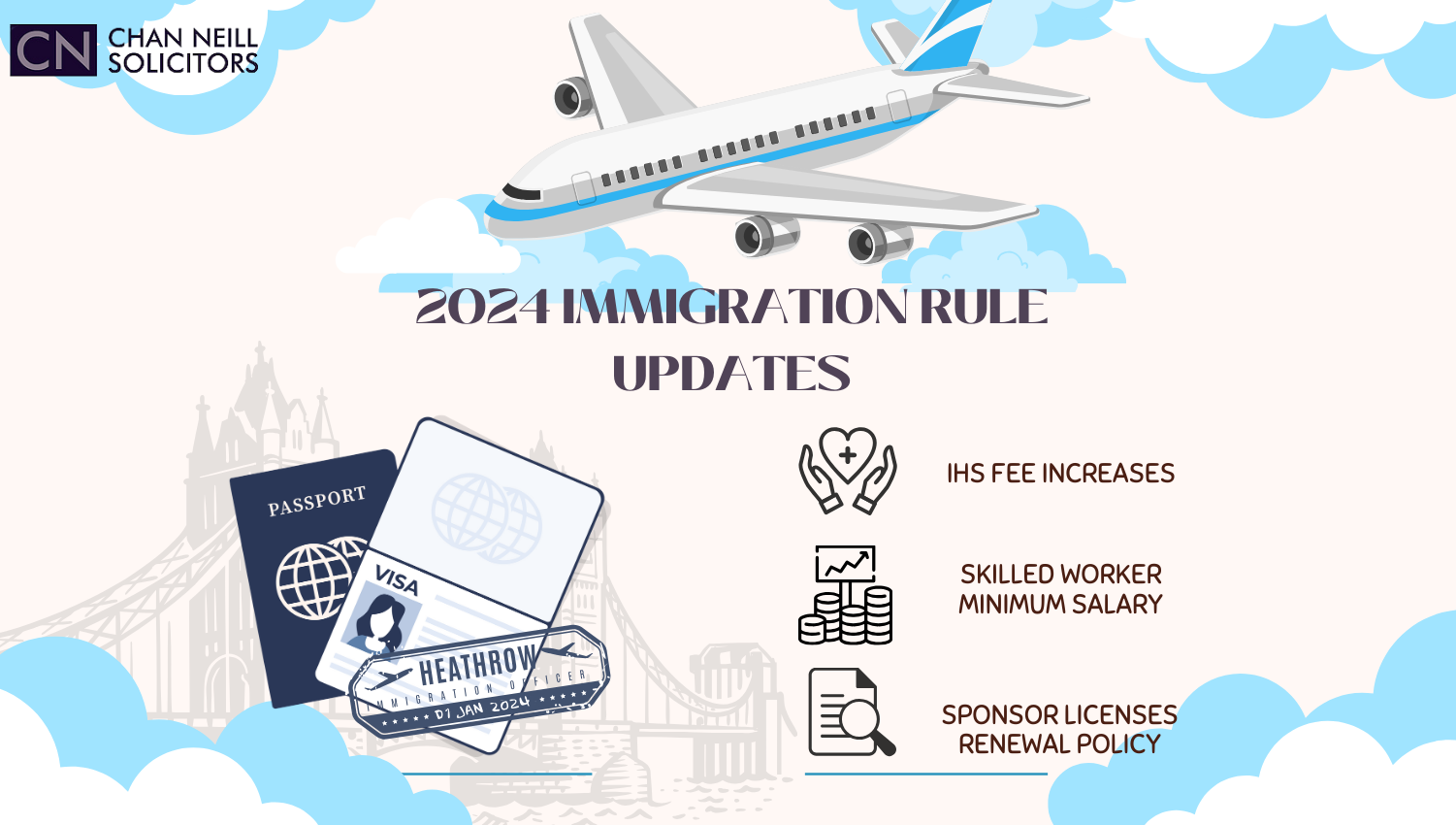2024 Immigration rule updates
Recently, the United Kingdom has implemented significant changes in its immigration policies, impacting both businesses and individuals. Notable revisions include:
- The Immigration Health Surcharge (IHS).
- Skilled worker minimum salary threshold.
- Spouse, Partner visas (Appendix FM) minimum income threshold.
- The renewal policy for business sponsor licenses.
These changes have introduced considerable financial challenges and administrative shifts for those planning to work, study, or reunite with family in the UK. This article explores these critical immigration developments and their multifaceted effects on immigration processes, recruitment strategies, and administrative burdens.

The Immigrant Health Surcharge Rise
The UK government's recent revision of the Immigration Health Surcharge (IHS), effective from 6th February 2024, presents substantial financial challenges for businesses and individuals. The IHS has seen a significant increase, rising from £624 to £1035 annually and an increase from £470 to £776 for children under 18, students and their dependents. This policy change aligns to make a sufficient financial contribution' reflecting the government's commitment to addressing the impact of migration on the NHS.
The IHS is a mandatory fee for those intending to stay in the UK for over six months. While incremental increases in the IHS have occurred since 2019, this recent rise poses a significant financial challenge for businesses reliant on international talent, potentially effecting their ability to attract and retain skilled overseas workers. Companies may need to reassess compensation and benefits packages, revise recruitment budgets, and consider the overall impact on organisational costs. Similarly, individuals, especially skilled workers, and international students, must engage in careful financial planning as the higher IHS fee adds to the overall cost of obtaining a UK visa. This change may discourage some from choosing the UK as their destination for work or study, potentially reducing the available recruitment pool.
Skilled worker minimum salary threshold.
The recent changes in the skilled worker minimum salary threshold announced on 4th December have far-reaching implications. This nearly 50% rise from £26,200 to £38,700 will come into force from 4th April and could lead to reassessing hiring strategies, particularly for sectors heavily reliant on low-paid skilled migrants. The policy will significantly impact the recruitment pool as it becomes more difficult for immigrants to apply for visas and meet the minimum threshold in the UK. While intending to attract highly paid skilled workers, it may also necessitate a review of hiring strategies in sectors dependent on low-paid skilled migrants.
These changes also impact the Graduate Visa route, vital for international students seeking employment in the UK. While the Graduate Route offers opportunities, the new immigration rules and the raised minimum salary threshold may influence career decisions, potentially affecting sectors traditionally employing international graduates. Moreover, when coupled with increased visa application fees and health surcharges, these policy changes create additional hurdles for individuals pursuing work and education in the UK.
Spouse, Partner visas (Appendix FM) minimum income threshold.
Additionally, aiming to reduce net migration, the Home Secretary has announced a gradual increase in the minimum income requirement for Spouse and Partner visas. Starting 11th April, the threshold will increase from £18,600 to £29,000, eventually reaching £38,700 by early 2025. Family visas are crucial for individuals seeking to reunite with their family members, partners, or spouses in the UK. Anyone wishing to bring their family to the UK must consider applying for a visa before the new requirements take effect in April.
The renewal policy for business sponsor licenses.
On the other hand, a significant change in the UK's immigration law regarding business sponsor licenses takes effect from 6th April 2024. This change automatically extends all sponsor licenses set to expire after this date by ten years, eliminating the need for renewal and associated fees. Nevertheless, sponsors with licenses expiring before 6th April 2024 still need to apply for renewal and pay the associated costs to remain licensed. Failure to renew could lead to employment restrictions for sponsored employees. The new policy removes the need for renewal every four years, reducing administrative efforts and costs burdened on businesses.
This change is a significant relief for businesses employing foreign workers. Eliminating renewal requirements means cost savings and less time spent on administrative processes. Businesses can focus more on strategic talent acquisition and management without worrying about sponsor license renewals. With these changes, companies must understand their new responsibilities and opportunities. The extension of the sponsor license validity period marks a positive shift for firms in the UK, simplifying the process of employing foreign talent and providing more stability and predictability.
Given these significant changes, our law firm extends its expertise in providing legal advice and support to navigate the evolving immigration landscape. We assist businesses in understanding and complying with new regulations, optimising recruitment strategies and addressing legal challenges. We also guide individuals, particularly skilled workers and international students in navigating visa applications and career planning amidst these transformative shifts. Our firm ensures that businesses and individuals can thrive in this changing immigration environment.
This article is provided for general information only. It is not intended to be and cannot be relied upon as legal advice or otherwise. If you would like to discuss any of the matters covered in this article, please contact us using the contact form or email us at reception@cnsolicitors.com
